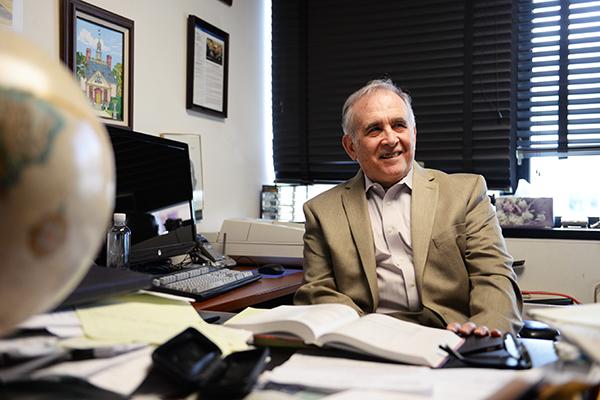
A professor who has guided the Faculty Senate through an overhaul of GW’s sexual assault policy and updates to the Faculty Code will lead the body as it prepares to decide University-wide policy changes.
After a tense year between faculty and administrators, Charles Garris has emerged as a strong faculty advocate, pushing for open discussions with the University’s top leaders, while also serving as a compromiser.
Now Garris will oversee the senate as it mulls a University-wide tenure committee, changes to dean search processes and the roles that non-tenure track professors play in their schools.
Garris, who has taught engineering at GW for 36 years, took control of the senate’s executive committee this month, after a year of leading another one of the organization’s most active committees. In that post, he’s forged a strong relationship with the Board of Trustees, which professors say will be crucial to maintaining their negotiating position.
“We have someone who’s intimately familiar not only with the institution, the faculty code, but has had this ongoing discussion with this task force for the last year,” said Scheherazade Rehman, last year’s executive committee chair, referring to the group reworking the Faculty Code.
As a liaison between the faculty and the Board this year, Garris has displayed his skills in bringing faculty members together to solve disputes, Rehman said.
She pointed to a resolution overhauling GW’s sexual assault policy that Garris presented last year. She said it was “a great feat” that it passed through the senate unanimously, after faculty debated the length of time that victims would have to file a formal complaint.
As chair of the Professional Ethics and Academic Freedom committee this year, Garris met regularly with Board of Trustees chair Nelson Carbonell. He first lobbied Carbonell to include more faculty in plans for revising their governing document, the Faculty Code.
He then pushed forward a resolution asking the task force to report to the Faculty Senate with its recommendations before it went to trustees, and persuaded Carbonell to extend his timeline because professors feared one year was too short.
After months of skepticism about Carbonell’s plans, Garris said he is confident the changes will help GW grow.
“This is going to strengthen shared governance instead of weaken it,” he said. “We’ll be able to say for the first time that we’ll be able to take a fresh look at the Faculty Code and other documents and see how we can make some permanent improvements.”
In a five-minute speech at the Board of Trustees meeting Friday, Garris said the Board had earned faculty’s trust this year, despite initial fears. He admitted the announcement to revise the code stunned faculty members, but town hall meetings with the task force, which includes three board members, have eased concerns.
“I believe this exercise was instrumental in building trust, confidence and making the task force well informed,” he told the trustees.
Michael Castleberry, who lead the executive committee in 2012 and 2013, said Garris was one of the most well-respected professors at the University, and that he’s formed strong relationships in his decade on the senate.
“He is probably the most qualified member of the senate right now just in terms of history and the breadth of his knowledge,” he said.
Garris has played a significant role in convincing outspoken faculty members to agree on difficult topics, Castleberry added.
David McAleavey, a member of the executive committee, said Garris used his experience to show Carbonell which issues were important to faculty when revising the code.
But Faculty Senate members have for decades opposed the University’s increasing investment in science and engineering, academic areas that it has historically not been known for, and Garris could face opposition. He missed out on the top spot last year because some members did not want an engineering professor to lead the group.
He was also influential in faculty efforts to shed more light on former GW School of Business Dean Doug Guthrie’s plans for the University’s growth in China, according to emails from last summer between Faculty Senate members and top administrators obtained by The Hatchet.
Faculty leaders pushed against administrators’ plans to open a campus in China this fall, after many said they’d been left in the dark during negotiations with Chinese universities and governments. Garris said faculty had wanted more input in forming GW’s partnerships.
– Chloé Sorvino contributed reporting.







